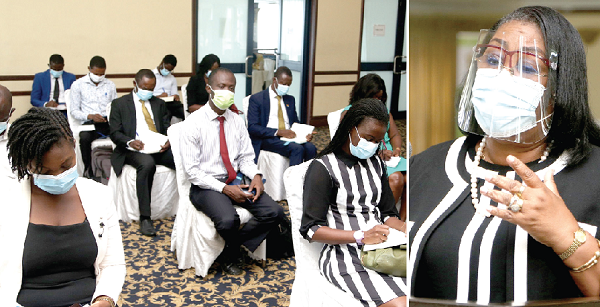The Registrar-General’s Department (RGD) has given all existing businesses up to June 30, this year to provide information on the actual owners of the establishments, also known as beneficial owners (BO).
The Registrar-General, Mrs Jemima Oware, who issued the directive, cautioned that after the deadline, businesses that did not comply would be sanctioned.
She, however, said the department was more interested in compliance than punishing offenders.
Event
Mrs Oware was speaking at a media sensitisation workshop on the beneficial ownership regime and its relevance in Accra last Tuesday.
It was also to educate the participants on the requirement of the law and the various BO E-learning modules and other resource materials.
The workshop was organised in collaboration with Strengthening Action Against Corruption (STAAC) and the Beneficial Ownership Strategic Support (BOSS) Team, both civil society organisations whose programmes are funded by the United Kingdom Department for International Development (DFID).
The BO regime, which took off in the extractive sector in October last year, has, since January 2, this year, been rolled out to cover all sectors of the economy.
Therefore, anyone seeking to register a business must now provide a BO information.
Categories
Mrs Oware listed the category of businesses that must provide information on their activities to include private and public companies limited and unlimited by shares, private and public companies limited by guarantee, as well as external companies.
"So, since January 1, 2021, we have requested every company that comes to register to download the form, fill it and attach it to the registration documents," she said.
Beneficial owner
A beneficial owner is a person to whom specific property rights in equity belong, even though legal title of the property may belong to another person.
Beneficial owners normally have directors or shareholders representing them, even though they are the real persons who will benefit ultimately from those companies.
Under the current regime, Mrs Oware said: “This person will now have to be disclosed, upon registration or when filing the annual returns.”
According to her, businesses were requested to have a register of BOs, but many companies did not have such registers.
"When I say members, I mean shareholders of a company; every company is supposed to have such a register with the names of who the real owners are.
“So between now and June 30, all company secretaries should start compiling the beneficial owners of their respective companies,” she said.
Mrs Oware added that when companies come to file changes or update their records through the filing of their annual returns, "it is mandatory for them to update us with the beneficial ownership information”.
Principles of BO
A lead facilitator with the BOSS Team, Mr Samuel Bekoe, said the BO regime sought to improve the way of doing business in the country.
He said it was important for people to know who they were doing business with “because people hide behind these companies to carry out money laundering, terrorism financing and other financial crimes”.
According to Mr Bekoe, politically exposed persons (PEP) were particularly required to declare their stake in companies to avoid using their influence to acquire contracts for their own benefit.
He mentioned such persons to include ministers of state, political party executives, government appointees, certain levels of civil service position holders, security service chiefs and their close relations.
Mr Bekoe said the BO regime would help Ghana improve on its revenue collection and also fight corruption by closing some tax gaps.
